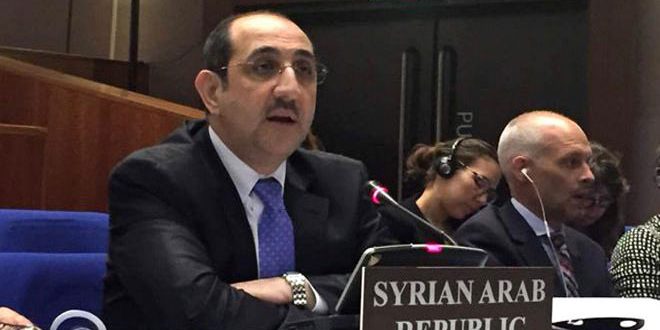Western States’ Using of OPCW to Serve Political Goals is Worrying, Undermines Future of Organization: Sabbagh
THE HAGUE– Due to the insistence of the US and some Western states to include controversial and politically-motivated issues in it, the Fourth Review Conference of the Organization for the Prohibition of Chemical Weapons (OPCW) failed to adopt a closing document, according to SANA.
The Fourth Special Session of the Conference of the States Parties to Review the Operation of the Chemical Weapons (Fourth Review Conference) was held at the Hague on November 21-30.
Syria’s Permanent Representative at the OPCW, Ambassador Bassam Sabbagh, told SANA that this conference, which is held every five years, was an opportunity for bridging division among member states which is caused by politicization and double standards practiced by the West, particularly regarding the use of chemical weapons by terrorists in Syria, like what happened on November 24 in Aleppo.
Sabbagh said Syria took part in negotiations regarding the closing document and stressed the importance of constructive dialogue, unifying positions, and enforcing the treaty in a balanced and unbiased manner.
The Ambassador regretted that Western states led by the US insist on using the OPCW to serve political goals against states including Syria, saying such behavior is worrying and could undermine the future of the organization, citing the failure of the conference to reach consensus on the closing document as an example.
Sabbagh concluded by affirming that Syria has fulfilled its commitment as per the treaty, adding that Syria has disposed of its chemical weapons and production facility in record time, which is a unique example and a success story for Syria, the OPCW, and the states that supported this process.
OPCW nations fail to agree on final document after Review Conference : Shulgin
 According to Itar Tass, Russia’s Permanent Representative to OPCW Alexander Shulgin said Friday that member nations of the Organization for the Prohibition of Chemical Weapons (OPCW) have failed to agree on a final document at the Fourth Review Conference that was held in The Hague on November 21-30.
According to Itar Tass, Russia’s Permanent Representative to OPCW Alexander Shulgin said Friday that member nations of the Organization for the Prohibition of Chemical Weapons (OPCW) have failed to agree on a final document at the Fourth Review Conference that was held in The Hague on November 21-30.
“A group of Western countries has done their utmost to not agree on the final document of the Review Conference,” he told Tass. “As a matter of fact, they ‘killed’ the draft by suggesting, at the very last moment, wordings that are absolutely unacceptable for a big number of states, including us, due to principled considerations.”
“Russia, along with China, Iran, Syria and its CSTO [Collective Security Treaty Organization] partners firmly repelled all the attacks of our opponents,” Shulgin stressed. “We cited concrete examples to demonstrate how selective the Americans are in the provisions of the Chemical Weapons Convention, that they violate its norms pretty often. Notably, nowadays they are the only country which has considerable chemical arsenals that have not yet been destroyed. Moreover, they are holding back on it until 2023, despite the fact that they have necessary financial, technological and human resources.”
“We stressed that the United States continues efforts to factionalize the organization,” he said. “They care little both about two-way diplomacy and opinion of other players. They want the OPCW to be a manageable instrument to resolve the tasks they want. The Americans have turned into repeated violators of international law, substituting it with the rules they invent.”
“The conference has demonstrated that the organization, which used to be one of the most successful international forums in the area of disarmament and nonproliferation and which was awarded the Nobel Peace Prize, is now in a profound crisis and the responsibility for it rests on those who, being guided by politically motivated considerations, continue to whip up tensions within the OPCW,” he said. “Upon the Russian delegation’s initiative, a group of 27 member states adopted a joint statement expressing serious concern about the organization’s future and calling for restoring the spirit of cooperation and consensus in its framework.”
“Only following this path, we can bring the OPCW’s work back to a constructive course and begin to act in the interests of the universalization of this major international treaty serving the task of resolution of pressing problems of today, including rebuffing chemical terrorism,” he underscored.
“Only by taking this path, we can bring OPCW’s work back on the constructive course and start acting in the interests of universalizing this important international agreement in the sphere of solving current problems, including fighting against chemical terrorism,” Shulgin stressed.
H.M

